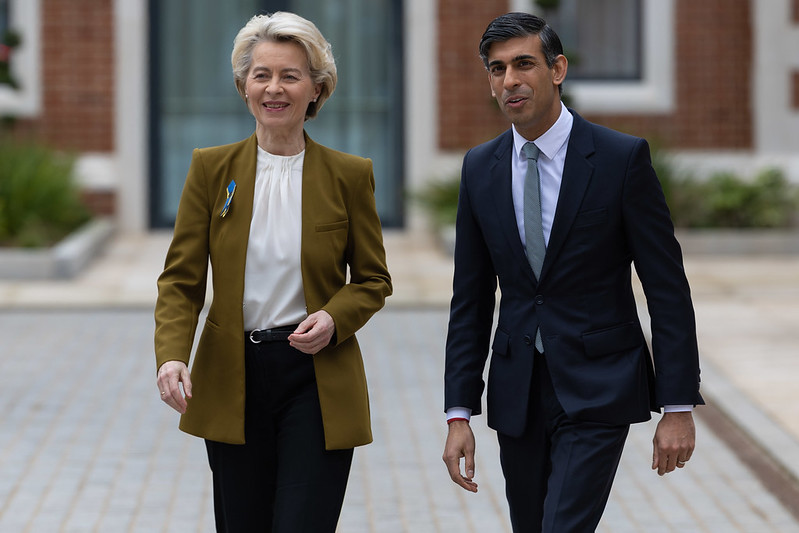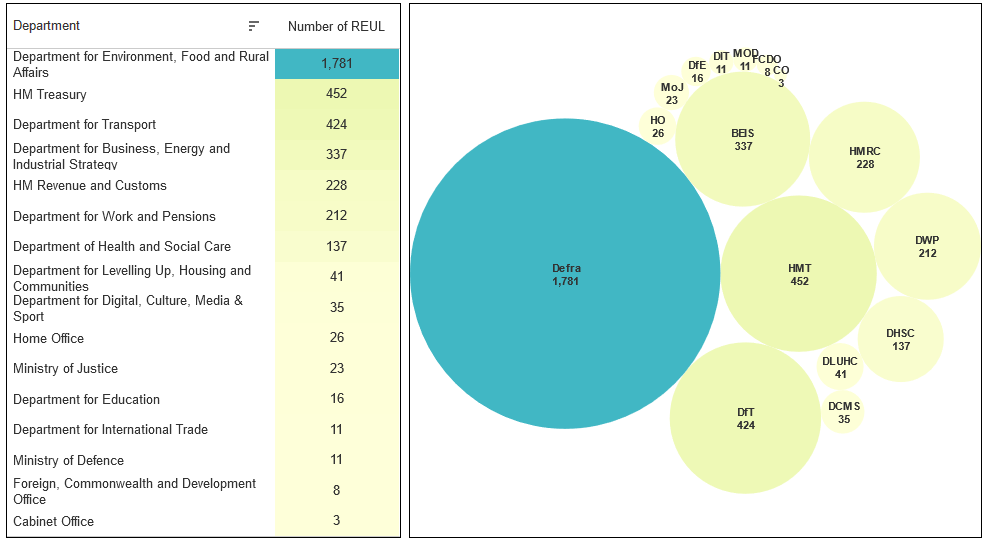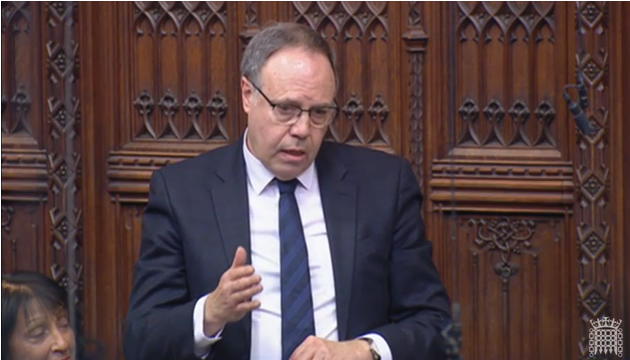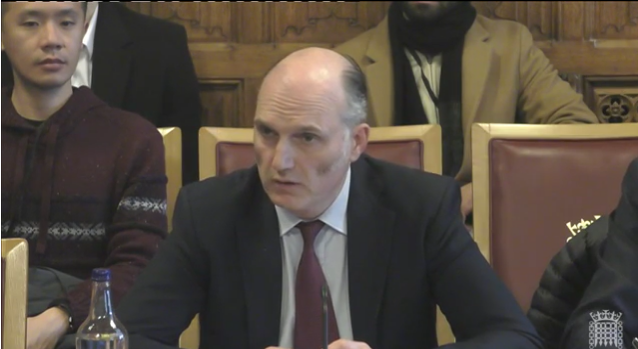Brexit & Beyond newsletter
13 March 2023

Welcome to the 13 March 2023 Brexit & Beyond newsletter
This week’s newsletter covers the possible timeframe for finalisation of the Windsor Framework, which some major businesses in Northern Ireland have backed. The House of Lords has concluded committee stage of the Retained EU Law Bill. The UK Government has been pressed for detail on the volume of EU laws which will apply under the Windsor Framework. The Lords European Affairs Committee held an evidence session with the UK Minister for Europe, covering Horizon and other areas of EU-UK cooperation. The UK Government has published guidance on its Electronic Travel Authorisation Scheme; concerns remain about its impact on tourism.
Finalising the Framework
To translate the Windsor Framework (agreed in principle on 27 February) into legally binding commitments, the EU and UK will adopt decisions in the Withdrawal Agreement Joint Committee, and the EU will change its own rules (including on the movement of retail SPS goods, pets, and seed potatoes moving from Great Britain to Northern Ireland). The Framework revises the Protocol in a number of areas and covers customs, agri-food, medicines, VAT and excise, plus a new mechanism for the involvement of the NI institutions.

UK Prime Minister Rishi Sunak and President of the European Commission Ursula von der Leyen in Windsor | Source: Simon Walker / No 10 Downing Street
RTÉ reports that the EU could formally adopt legislative elements of the Windsor Framework by 21 March, when a meeting of the General Affairs Council will take place. Officials from EU member states have been assessing the deal since 3 March. EU Ambassadors will meet on Friday and discuss their position on the key changes to be made. Tomorrow (Tuesday 14th), the European Parliament will debate the Windsor Framework and an implementation report on the Withdrawal Agreement.
Views on the Framework
Major businesses including, Sainsbury’s, Amazon, Diageo and Coca-Cola have signed an open letter to the Prime Minister welcoming the Windsor Framework “as a watershed moment for the UK-EU relationship”, saying that “it represents a huge opportunity for both the Northern Irish and Great British economies”. The business leaders state that they are “united in believing that the Windsor Framework is the most sustainable path forward for Northern Ireland and the rest of the UK.”
A LucidTalk poll for the Belfast Telegraph was published this weekend, which considers voters’ attitudes towards the Windsor Framework.
The Stormont Brake
The Secretary of State for Northern Ireland Chris Heaton-Harris said on Thursday that the Government will publish legislation within a fortnight, which sets out the operation of the Stormont Brake. The Windsor Framework includes this new provision for the involvement of the NI institutions: when new or amended EU laws on customs, goods and agri-food are introduced, which would apply to NI under the Protocol, the Brake could be pulled with the support of 30 MLAs from at least two parties. The EU and UK texts on the Brake set out various conditions and limitations for its use. The precise procedure for the mechanism is to be clarified by the UK Government.
At a garden centre in Belfast, Heaton-Harris said, “What we think it means, and what it will show in legislation, is that when the brake is pulled… then it [the changed EU law] is disapplied immediately…It goes to the Joint Committee where the UK Government will be bound to veto based on conditions that you’ve seen in the papers that we’ve published.” He said the criteria set out for pulling the Brake “really have to be fulfilled at the Assembly level…we’ll make an assessment but in the secondary legislation that we’ll be bringing forward, the Government will be bound.”
He also stated that the Government expects a vote on the Framework in the House of Commons “on a similar timeframe” to the European Parliament, which could be within two or three weeks.
Regulatory divergence and Retained EU Law
The House of Lords Sub-Committee on the Protocol has written to the Government again about regulatory divergence between NI and GB. It notes the Government’s statement that under the Windsor Framework there is “the prospect of significant divergence between the two distinct economies on the island of Ireland” in a range of areas, and requests information on the implications of the Framework for North-South divergence and for Northern Ireland’s continued access to the EU Single Market.
Dr Viviane Gravey and Dr Lisa Claire Whitten of QUB have published articles as part of the Brexit and Environment project. On the governance arrangements in the Windsor Framework, they ask “if the [Stormont] brake is applied what happens to affected law?”, suggesting that relevant EU law would continue to apply in its unamended or non-updated form and that “activating the brake risks placing Northern Ireland in a position of dual divergence with its two largest external markets.” On the implications for the environment, they state that the Framework “lays the groundwork for profound North/South divergence” and state that NI “will likely be open to much greater deregulatory risks” through the Retained EU Law (REUL) Bill than under the previous Protocol.
Lords concluded their detailed scrutiny of the Retained EU Law Bill in the final days of committee stage on 6 and 8 March. The Bill would “sunset” the majority of retained EU law so it expires on 31 December 2023, unless preserved. Members put forward amendments on the application of Common Frameworks, maintaining environmental standards, the extent of powers granted to ministers to repeal EU laws, and a requirement for ministers to analyse the impact of removing retained EU law.

The UK Government’s assessment of Retained EU Law by department | Source: UK Government
The Commons European Scrutiny Committee held an evidence session on regulating after Brexit with farming and food experts, where the Retained EU Law Bill was discussed. Nick von Westenholz from the National Farmers’ Union said they are supportive of the “broad idea behind the Bill…there are some areas where we definitely think we can do it better.” However, he raised concerns about the process set out in the Bill: “We are concerned about the timeframe, and the fact that decisions have to be made on every single piece of REUL…it might be a rushed job.”
EU law applying in Northern Ireland
In the House of Lords, Lord Dodds asked what EU law will be disapplied as a result of the Windsor Framework. The Government in its command paper states that the Framework “removes 1,700 pages of EU law, and takes with it any ECJ interpretation and oversight in those areas.” Minster in the NI Office Lord Caine said the Framework “completely carves out whole areas of EU law on issues such as VAT, medicines and food, in a way that the EU has never done before.” He went on to explain, “there will of course be some directives that are in part still applied, in respect, for example, of the red channel, and disapplied in respect of the green channel.” He added, “the situation is slightly more complicated than just adding together one list.”

Lord Dodds questioning the NI Office Minister in the House of Lords | Source: UK Parliament
The Commons European Scrutiny Committee has also requested a list of the EU rules that would still apply to NI if the Framework is finalised.
Lords question Europe Minister on UK-EU relations
On Tuesday the Lords European Affairs Committee took evidence from the Minister for Europe, Leo Docherty, who said that now the issues around the Protocol are settled, “we will see an acceleration of that formal co-operation” with the EU. Asked about the government’s coordination of its relationship with the EU, Docherty contended that the Framework “was the result of very clear higher commander’s intent. It was very clear that the Prime Minister and the Foreign Secretary were agreed on the approach. It was kept very private…The very close personal working relationships at the top of the Government gave this a coherence that proved useful.”

Leo Docherty, Minister for Europe at the Foreign, Commonwealth and Development Office | Source: UK Parliament
Asked to confirm that the Government is determined to join Horizon Europe, the EU’s €95.5 billion funding programme for research and innovation, the Minister said it would “premature” to comment specifically but that the Government is “absolutely open to that notion” and “discussions are ongoing”. Rebecca McKee of the Institute for Government has a Twitter thread on the background to the UK’s participation in Horizon, which was blocked over the dispute around the Protocol. She writes that the Government is “stalling” and has signalled a wish to renegotiate the fee to access Horizon. The issue was also raised in the Commons where Science Minister Michelle Donelan said, “We have not changed our position on Horizon…terms would have to be favourable for the UK—we have lost two years—and we would have to ensure value for money for the taxpayer.” She noted the Government’s alternative funding plan.
The Carbon Border Adjustment Mechanism (CBAM), a carbon tax on imported goods, was also discussed. It may apply to NI under the Protocol. Previously experts told the Lords European Affairs Committee that a CBAM could work “extremely badly” for transmitting electricity from Great Britain to Northern Ireland and would constitute "a significant regulatory barrier for companies in NI wishing to trade with the Republic of Ireland.” EU Director in the Foreign Office Olaf Henricson-Bell explained, “Given the very close similarities of our ETS systems at the moment, we would expect—and the EU knows—that, in any operation of the CBAM, the equivalence of our carbon pricing would be taken into account. That removes the core issue there, but CBAM also requires a set of reporting that companies would need to do against the requirements. That potentially has burdensome implications for our businesses. We are working on that.”
The session also considered the European Political Community; EU-UK cooperation on energy and sanctions; the movement of creative professionals; school visits and youth mobility.
Electronic Travel Authorisation
The UK Government has published guidance about its Electronic Travel Authorisation (ETA) Scheme, whereby visitors to the UK would have to apply for authorisation to enter. In a change to the initial plan, people who are legally resident in Ireland, and who do not need a visa, will not need an ETA when entering the UK from Ireland. Stephen Farry of the Alliance party welcomed the development, saying hopefully this “can reassure many people, especially those who cross the border on a regular basis.” He highlighted that there is still an issue for tourism. The Northern Ireland Tourism Alliance (NITA) said it is “disappointed” that the Government “has shown no flexibility to protect seamless travel across the island for most visitors.” The ETA scheme currently still applies to overseas tourists entering NI from the Republic of Ireland. NITA said over 70% of visits to NI arrive via Dublin and that the plan risks 25% of all tourism spend in NI. Sinn Féin MP Chris Hazzard says the legislation still presents “a clear and present threat to local tourism which relies heavily on visitors travelling from the south.” The party has raised the issue with the Taoiseach. SDLP MP Claire Hanna has called on the Government to scrap the ETA scheme, calling the proposals “unworkable” for people on the island of Ireland.
Other news
- The Prime Minister says he will formally invite US President Joe Biden to visit Northern Ireland to mark the 25th anniversary of the Belfast/Good Friday Agreement.
- The Government spent £196,567 in relation to the legal challenge on the lawfulness of the Protocol on Ireland/Northern Ireland. This information was provided in response to a written question from DUP MP Carla Lockhart. The Belfast Telegraph has more on the matter.
- The UK Government has confirmed funding for the next two years for the work of the NI Human Right’s Commission in relation to Article 2 of the Protocol. Under Article 2 of the Protocol, the UK Government committed to ensuring that there would be “no diminution of rights, safeguards or equality of opportunity” (as set out in the Good Friday Agreement) as a result of the UK leaving the EU. A ‘dedicated mechanism’ was established to implement this commitment: the Northern Ireland Human Rights Commission and the Equality Commission for Northern Ireland are tasked with overseeing and reporting on the Article 2 commitment.
- On 7 March, the EU Council unanimously voted to adopt a new law on a framework for the EU to respond to breaches of the Withdrawal Agreement and Trade and Cooperation Agreement.
- Legal experts have noted that the EU-UK Trade and Cooperation Agreement could be suspended if the UK leaves the European Convention of Human Rights over its plans to stop small boats crossing the English Channel.
- Ulster University Economist Mark Magill considers recent data on migration to Northern Ireland, noting, “While the future long-term quantum of overseas workers is still uncertain, the decrease in EU nationals and increase in non-EU nationals looks like a genuine structural shift mirrored elsewhere in the UK”. The UK’s post-Brexit immigration system ends free movement from the EU and prioritises skilled labour.



